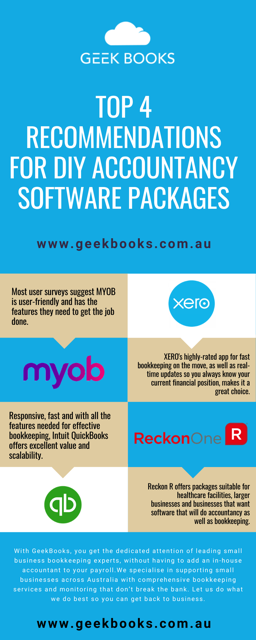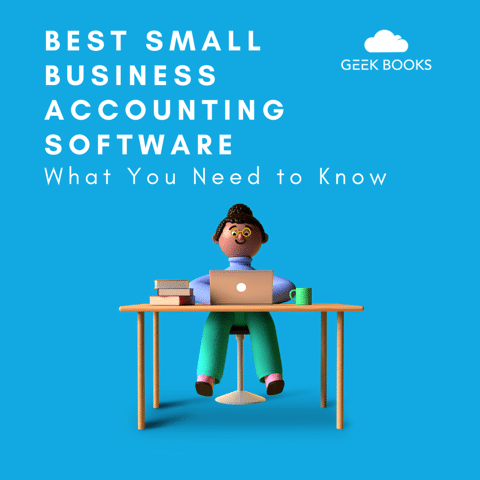The reality is that a spreadsheet alongside a box of receipts just isn’t going to cut it when it comes to maintaining accurate accounts for a small business. Even if you’re a one-man-band, a sole trader or a micro-business that only has a couple of employees, accessing some form of accounting software is going to be essential in order to keep accurate, up-to-date books.
The challenge for SMEs, start-ups and micro-businesses is to find a way of using small business accounting software so that it meets their requirements, without costing an absolute fortune and requiring vast amounts of time and resource to operate correctly.
As a leading provider of online accountancy and bookkeeping support for smaller enterprises, Geekbooks knows a thing or two about accounting software for small business, which is why we’ve put together this handy guide to all things software related. We are an established digital accounting and bookkeeping firm that offers an affordable solution to small business bookkeeping – why not get in touch and ask about our competitive prices and 30-day money-back guarantee?
Read on to discover:
– What your software needs to do.
– Our top five recommendations for DIY accountancy software packages.
– Discussion of the main advantages that using your own software can bring.
– Discussion of the potential downsides of software for small business, along with some alternative options to consider.
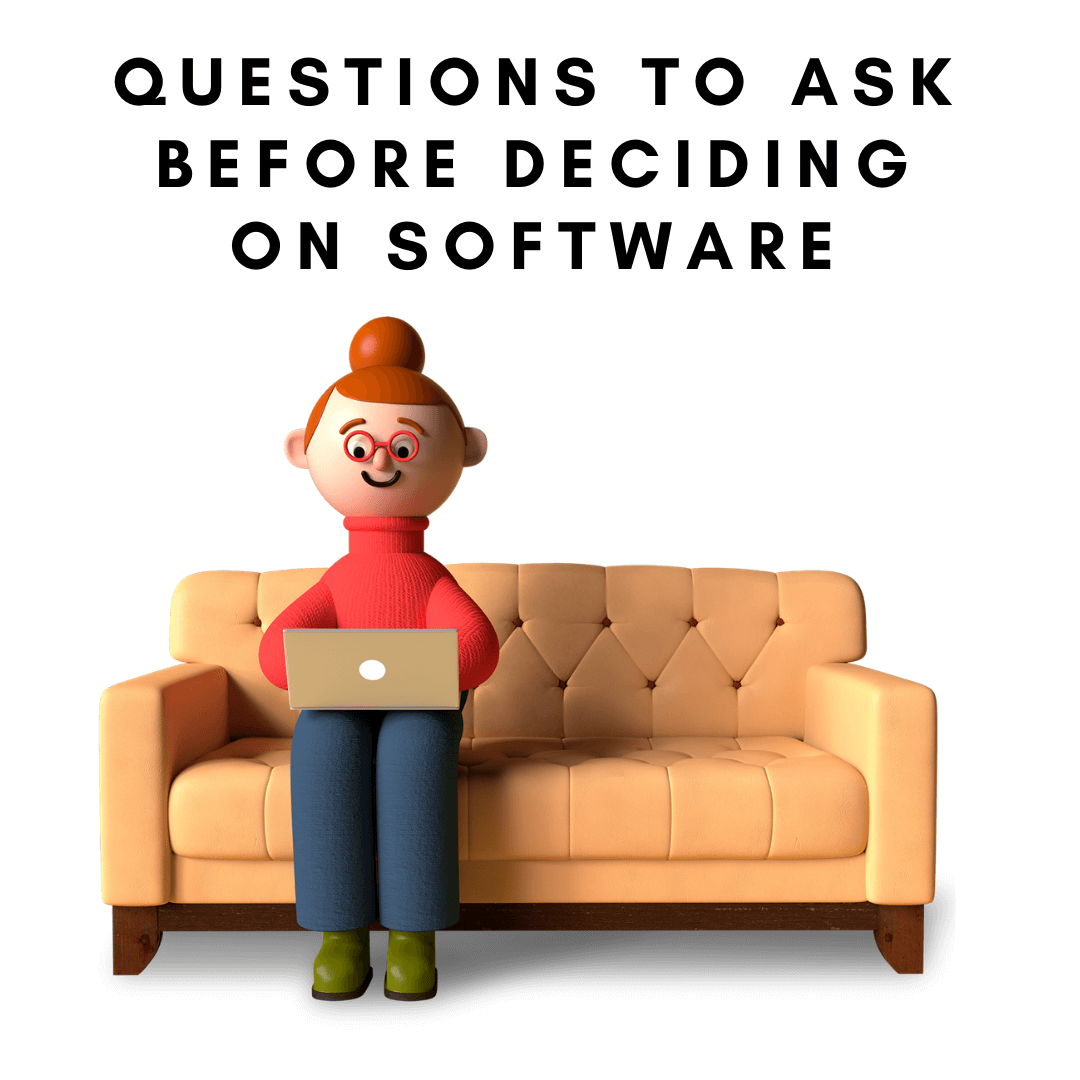
Questions to ask before deciding on a software package
There are currently a large number of packages on the market, so finding the best accounting software for small businesses can be a confusing and arduous process. In order to create a suitable shortlist of packages, it’s usually best to decide the answers to the following questions. This information will inform your choices, helping to determine a handful of packages that may work for your enterprise.
1. What do you want your software to do?
It’s worth noting that whilst most accounting software will perform simple tasks, such as creating invoices, keeping track of transactions and calculating how much tax you need to pay, some offerings provide more facilities than others. If you have specific needs (for example require software that has the ability to do payroll, or need accounting software that can be synced with platforms such as Paypal, Mailchimp or Shopify), it’s important to make sure they’re accommodated in your software choice.
2. What sort of budget do you have?
There are several accountancy software packages out there that are completely free to use; others offer free trials or competitive subscriptions. Whilst it’s tempting to opt for the cheapest, be aware that basic packages may not always tick all your boxes. Given the importance of ensuring your financial data is secure, accurate and delivered to ATO and other partners in a timely, appropriate manner, it’s often worth spending a little more in order to get the results you want.
3. Security and data storage
Your accountancy software won’t just contain details of your financial operations, it’s also highly likely to contain sensitive information regarding your clients. Nobody wants to be sued for a data breach, which is why it’s vital that your accounting software is secure enough to outwit hackers and other unauthorised personnel. In general, online software that uses cloud storage is extremely secure: because the responsibility for security rests with the software provider, rather than the user, these sorts of systems benefit from multiple levels of complex security.
4. Degree of resource required to manage the software
Some software packages require little effort to set up, enabling users to “hit the ground running” when it comes to using them for accounting purposes. Others require a lengthy set-up period and may need to have significant amounts of data uploaded before they can become fully operational. The length of lead-in time that your organisation can cope with has an impact on the software that’s going to be best for your needs.
5. Level of accountancy expertise needed to run the software
Despite what you may read in accountancy software ads, the reality is that if you’re not used to working with accounting software, or don’t have an excellent understanding of what should be included as part of the accounting process, it’s all too easy to get online accounting wrong. If you don’t have an aptitude for figures and haven’t employed someone to run the software for you, it may well be that you find it difficult to get the full value from accountancy software.
6. Scalability
The hope is that, over time, your business will grow and evolve. This should mean an increased turnover, more employees and, potentially, more money at stake when you make key financial decisions. If this is the type of plan that you have for your business, it’s important that the accounting software you choose is able to grow with you. Scalability is the potential a piece of software has to accommodate larger amounts of data, transactions or tasks without needing to be altered or upgraded. If you plan to grow, scalability is crucial.
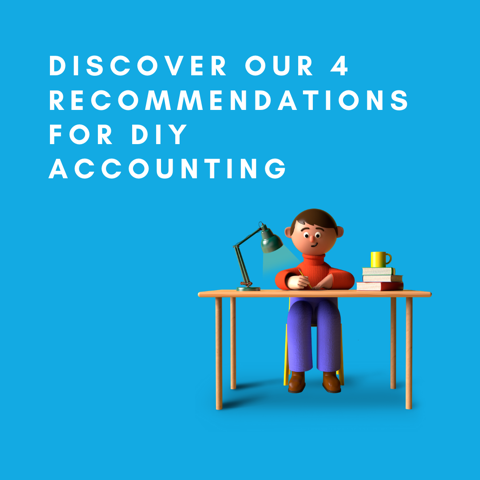
Small business bookkeeping software: our top four
With so many different options out there, deciding on the best small business accounting software can be difficult. We’ve identified four software packages that offer great value, and are suitable for smaller businesses that have relatively modest accounting and bookkeeping needs.
MYOB
A multi-faceted package with plenty to offer, MYOB offers three payment tiers: the least expensive provides payroll services; the middle-cost package offers payroll services, plus facilities to send invoices and quotes, as well as record bills and expenses; with the top-tier plan, users enjoy everything offered in the middle-cost plan, as well as additional facilities to manage an inventory and quote/hour and track jobs. Most user surveys suggest MYOB is user-friendly and has the features they need to get the job done.
MYOB can also be managed remotely, meaning you can stay on top of your business whilst you’re on-site, travelling or at home. MYOB also offer a FREE 30-day trial.
XERO
With a highly-rated app for fast bookkeeping on the move, as well as real-time updates so you always know your current financial position, XERO has sufficient capacity to meet the needs of medium-sized businesses, as well as start-ups and smaller enterprises. XERO offers three different price plans, which are based on scale rather than capability: for example, the cheaper package includes processing of up to twenty invoices, as well as payroll for a single person. The middle packages offer similar services, but for larger numbers of invoices and employees respectively. Like MYOB, XERO offers a FREE 30-day trial.
Intuit QuickBooks
Responsive, fast and with all the features needed for effective bookkeeping, Intuit QuickBooks offers excellent value and scalability. The capabilities in each tier reflect the type of business it’s best suited for: for example, the priciest tier includes advanced features such as project and inventory tracking and budget management, as well as payroll for ten staff. In contrast, the lowest tier provides payroll for up to four staff and provides basic accounting functions (invoices, cash flow management, expense tracking etc). A FREE 30-day trial is available.
RECKON R
An Australian brand, whose data is stored in Australia, Reckon One is the small business software offered by Reckon R. Reckon R has developed a suite of software services, offering packages suitable for healthcare facilities, larger businesses and businesses that want software that will do accountancy as well as bookkeeping. Reckon One scores highly in reviews, as well as having one of the best value, basic tier prices per month. That said, the basic tier doesn’t include payroll or invoicing services, so most businesses will need to opt for the next tier up. Reckon One works on all devices (including mobile phones) and benefits from high-grade security.
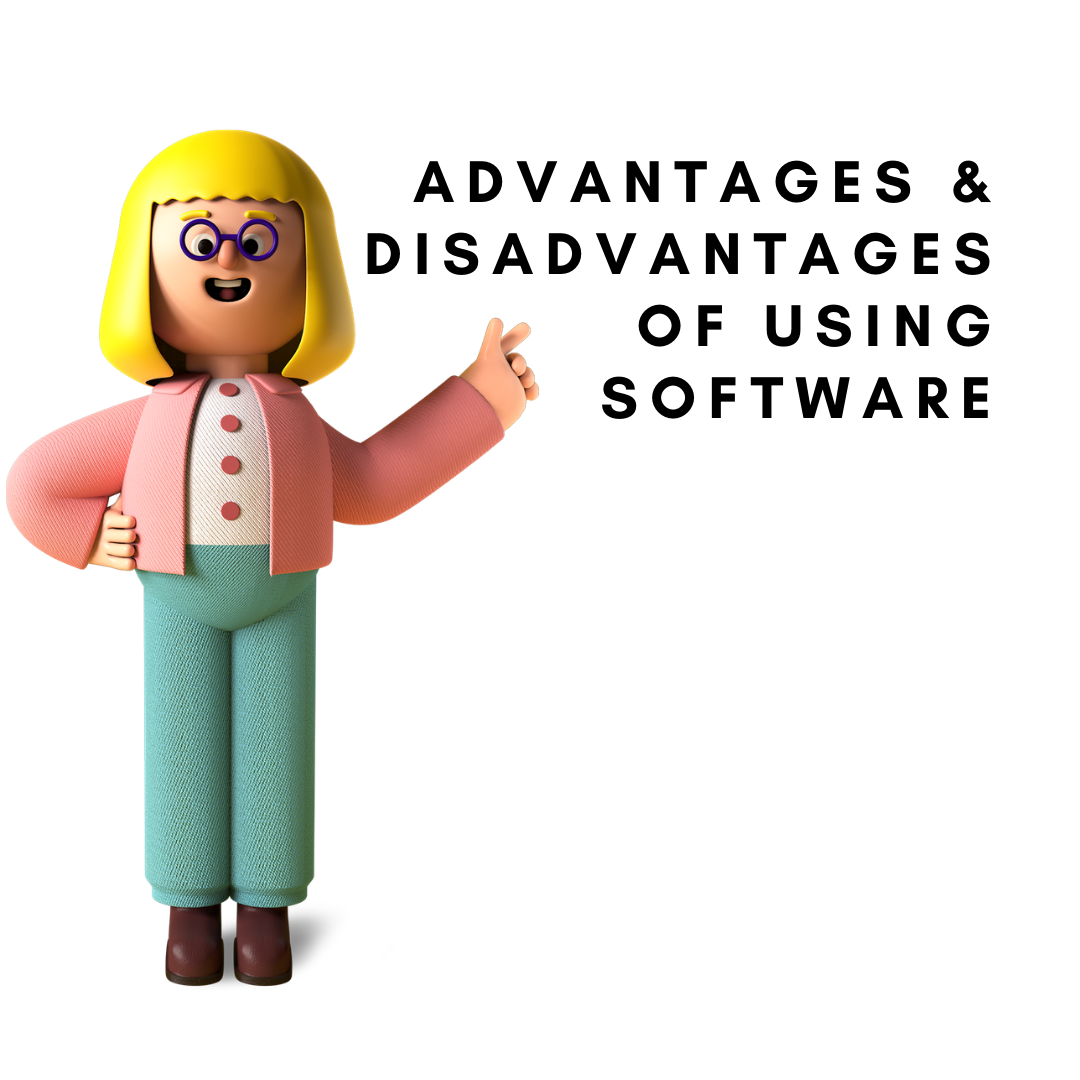
Advantages and Disadvantages of small business financial software
Here we consider the pros and cons of using financial software to complete your bookkeeping.
Degree of flexibility
Although several software providers allow users to up- or downgrade their package on a monthly basis, the rigidity of the service offered within an individual plan can make it difficult to accommodate fluctuations within the business. Businesses that take on temporary staff to cover busy periods, for example, or businesses that have irregular sales patterns, may find that they end up with software capabilities that are either too little or too great for their needs. In contrast, using an external company like Geekbooks means you only pay for the hours you use, with added assistance available when needed. Why not take advantage of our 30-day money-back guarantee and see the difference?
Accountancy input
Whilst the software will usually provide the data that you need to complete a tax return or generate a basic cash flow report, what it won’t do is tell you how to minimise tax obligation or how best to interpret cash flow figures. When considering the resources needed for financial management, it’s important to consider where you will procure the necessary expertise to interpret your financial data and help you plan for the future. Even the best software for small business bookkeeping isn’t going to be a substitute for customised input from a financial professional. This is why many businesses opt to use a professional bookkeeping company, as they can provide a higher level of financial analysis and insight.
When things go wrong
All it takes is an inaccuracy in data entry, or a failure to set your software up correctly, and your books can swiftly take a turn for the worst. Unfortunately, if you end up with an issue, it’s down to your company to resolve the problem (unless it’s of a technical nature). In contrast, using a virtual bookkeeper means they will pick up inaccuracies and resolve them as part of their service.
Resource to keep the bookkeeping up-to-date
If you use a software package, not only will you need to pay for the use of the software, you’ll also have to find the resource to input data, chase late invoices, generate reports and do all the other work necessary to ensure the software remains a valuable tool. Even if, as a sole trader or owner of a micro-business, you do the work yourself, that’s still hours of your day which aren’t being spent delivering your goods and/or services. For many companies, it’s more cost-effective to contract out bookkeeping work, then it is to find the time to complete it in-house. Geekbooks could free you up to get on with running your business – use our 30-day money-back guarantee to see what happens when you let the professionals take over your bookkeeping for a month.
ATO deadlines won’t wait
When it comes to submitting forms to the ATO such as BAS (GST/PAYGW) and as well as preparing your Income Tax Returns, smaller businesses can often find it a challenge to find time to complete the relevant paperwork at the same time as continuing to run their operation. Unfortunately, ATO won’t wait! This is where outside assistance can come in handy: even if you’ve got a busy period when your reporting information is due in, a virtual bookkeeper can make sure it’s completed on time.
There are several contenders for the title of “best bookkeeping software for small business”. For many SMEs, the challenge lies not in selecting the best software, but in having the internal resources to use and manage it optimally. That’s where a virtual, external bookkeeping agency really comes into its own, offering an expert, competitively priced service that takes the hassle out of financial information gathering and management.
Geekbooks is the home of expert, professional, virtual bookkeeping services: ask about our 30-day money-back guarantee!
